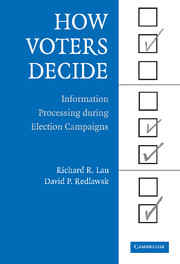Book contents
- Frontmatter
- Contents
- List of Tables and Figures
- Acknowledgments
- HOW VOTERS DECIDE
- I Theory and Methods
- 1 Introduction
- 2 A New Theory of Voter Decision Making
- 3 Studying Voting as a Process
- 4 What Is Correct Voting?
- II Information Processing
- III Politics
- IV Conclusion
- Appendix A Detailed Examples of Decision Strategies in Action
- Appendix B How the Dynamic Information Board Works
- Appendix C Overview of Experimental Procedures
- Appendix D Detailed Decision Scripts
- Appendix E Calculating the On-line Evaluation Counter
- References
- Index
- Titles in the series
1 - Introduction
Published online by Cambridge University Press: 05 September 2012
- Frontmatter
- Contents
- List of Tables and Figures
- Acknowledgments
- HOW VOTERS DECIDE
- I Theory and Methods
- 1 Introduction
- 2 A New Theory of Voter Decision Making
- 3 Studying Voting as a Process
- 4 What Is Correct Voting?
- II Information Processing
- III Politics
- IV Conclusion
- Appendix A Detailed Examples of Decision Strategies in Action
- Appendix B How the Dynamic Information Board Works
- Appendix C Overview of Experimental Procedures
- Appendix D Detailed Decision Scripts
- Appendix E Calculating the On-line Evaluation Counter
- References
- Index
- Titles in the series
Summary
Democracy succeeds when government, in some broad sense, represents the will of the people. Democratic representation can be assured if informed citizens freely elect their leaders, and those leaders stand for reelection at some regular interval. Thus citizens, voting for leaders who best represent their views, and holding those leaders (or their political parties) accountable for their performance in office at the next election, make democracy work. At least that is the theory.
Naturally enough, voting is a topic that has drawn quite a bit of attention in political science, and the classics of political behavior research have all focused, in one way or another, on the vote decision. Understanding how voters make their decisions is tantamount, at some very basic level, to understanding how democracy works. There can be no more important question in political science. Yet with all of our research over the past half century, and the numerous models of vote choice that have been proposed, how much do we really know about how voters decide?
If that question is understood to mean how well can we predict or explain the vote in a statistical sense, the answer is quite well indeed. The existing models do an excellent job of prediction, including appropriate voter, campaign, candidate, and political environment factors into a regression stew and “explaining” with high accuracy which voters choose Democrats and which choose Republicans.
- Type
- Chapter
- Information
- How Voters DecideInformation Processing in Election Campaigns, pp. 3 - 20Publisher: Cambridge University PressPrint publication year: 2006

